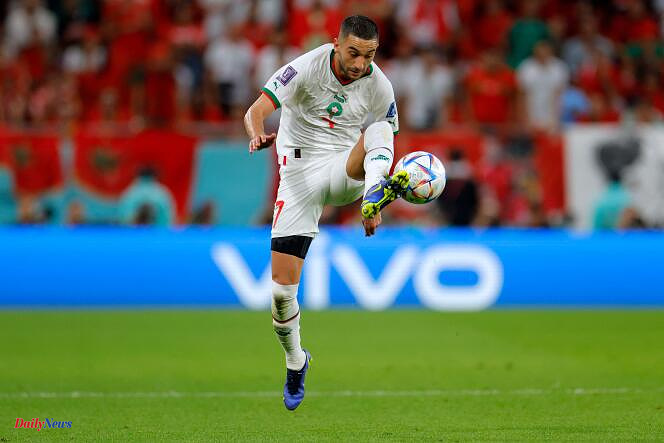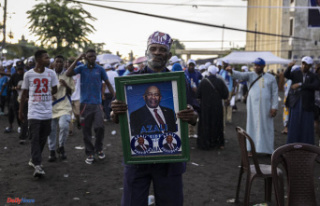Since the African Cup of Nations (CAN) was created in 1957, only three teams have managed to retain their title: Egypt, victorious in 1957 and 1959, then achieving a historic treble 2006-2008-2010; Ghana, titled in 1963 and 1965; and Cameroon in 2000 and 2002. Suffice to say that the Teranga Lions of Senegal, crowned for the first time in their history in 2022 in Cameroon, would achieve a small feat by leaving Abidjan on February 11 with a second trophy in their suitcases.
Aliou Cissé's players will be candidates for their own succession, but the circle of contenders is quite large. We think in particular of Ivory Coast, the organizing country, of Morocco, astonishing during the last World Cup in Qatar, of Egypt of the phenomenon Mohamed Salah, or of Algeria, determined to wash away the affront of 2022 where she presented herself with the label of favorite after her title obtained in 2019 in Egypt and left Cameroon on the evening of the first round. Nigeria, Tunisia or Cameroon may also have ambitions.
Ivory Coast
The last organizing country to have won "its" African Cup of Nations was Egypt, in 2006. Ivory Coast, automatically qualified but which nevertheless took part in the qualifiers, has a fairly precise idea of this who awaits him in front of his audience. Idriss Diallo, the president of the Ivorian Football Federation (FIF) tried to alleviate the pressure weighing on the Elephants and Jean-Louis Gasset, their French coach, explained that reaching the semi-finals would be a sign of a successful tournament, it is not certain that the local public will be satisfied with it.
Since Mr. Diallo entrusted the selection to this experienced technician who had never worked in Africa, it has not always been very calm. Certain matches, including a defeat in Zambia (0-3), worried the Ivorians. But the last outings were better negotiated, and the 1992 and 2015 African champions can count on experienced players like Serge Aurier, Max-Alain Gradel, Franck Kessié, Sébastien Haller – even if he is going through a complicated period with his Borussia Dortmund club – and promising young people, such as Karim Konaté or Evan Ndicka.
Senegal
Since the coronation of Yaoundé in 2022, Senegal has confirmed its status. He qualified for the World Cup in Qatar and for the Ivorian CAN, without trembling. The Lions of Teranga are, with those of Atlas (Morocco), the two best African selections in the FIFA rankings, respectively ranked 20th and 13th. It is therefore legitimate to make the Senegalese one of the favorites of the competition.
The longevity of coach Aliou Cissé, appointed in February 2015, proves that technical stability is an asset. The presence in a squad of a world-class player like Sadio Mané is another. The main architect of the 2022 triumph, the vice-captain of the Lions went into exile in Al-Nassr (Saudi Arabia) after a difficult season at Bayern Munich. His performance has not been impaired, and the 31-year-old striker is fortunate to be well surrounded. With a few exceptions, the 2022 winners will indeed be traveling to Ivory Coast.
Morocco
Walid Regragui, Morocco coach, was only 6 months old when the Atlas Lions won their first and only CAN, in March 1976, in Ethiopia. Since the 4th place obtained at the World Cup in Qatar, their supporters have openly dreamed of a second continental coronation. But the Moroccan coach, who knows the difficulty North African teams have in expanding to the sub-Saharan part of the continent, was quick to declare that “Morocco could win, like others. »
The technical quality of the Lions, embodied by Hakim Ziyech, the defensive solidity to which Yassine Bounou, the goalkeeper, is no stranger and the efficiency of Youssef En-Nesyri constitute real assets. But the athletic dimension not being the strong point of the North African selections, the Moroccans risk suffering against Zambia, the Democratic Republic of Congo (DRC) and Tanzania, their three opponents in the first round.
Algeria
In 2019, Algeria won the CAN by playing offensive and spectacular football. Since then, the Fennecs, eliminated in the first round of the 2022 edition and not qualified for the World Cup in Qatar, have been less scary. The game on offer is no longer as flamboyant, the team scores fewer goals, but it remains one of the continent's sure values. Senegal and Morocco have certainly overtaken it in the FIFA rankings, without this limiting the ambitions of its coach, Djamel Belmadi.
Since the bitter failures of 2022, it has initiated a restructuring of its workforce by calling on new players, including Farès Chaibi (Eintracht Frankfurt) and Amine Gouiri (Rennes), while continuing to rely on the usual executives who are Riyad Mahrez, Islam Slimani, Aïssa Mandi, Rami Bensebaïni or Sofiane Feghouli. With a little less pressure on their shoulders, the Algerians, who inherited a relatively affordable group with Burkina Faso, Angola and Mauritania as opponents, are capable of doing much better than in Cameroon. A task that does not seem insurmountable for them.
Egypt
The most successful team on the continental scene with 7 trophies, the last of which in 2010 in Angola, rarely excites fans of the beautiful game. But Egypt must be recognized for its real consistency in its performances in the final phase of the CAN . Finalists in 2017 and 2022, the Pharaohs are a contender for final victory. The strong point of the selection is undoubtedly captain Mohamed Salah, one of the best attackers on the planet, whose technique, creative genius and sense of goal can change a match at any time.
The Liverpool player is also well surrounded by the Al-Ahly and Zamalek players, accustomed to playing conditions in sub-Saharan Africa, by the revelation Omar Marmoush (Eintracht Frankfurt) or by the experienced Mohamed Elneny (Arsenal) and Mahmoud Hassan , nicknamed “Trezeguet” (Trabzonspor) for his resemblance to the French striker, world champion in 1998.












